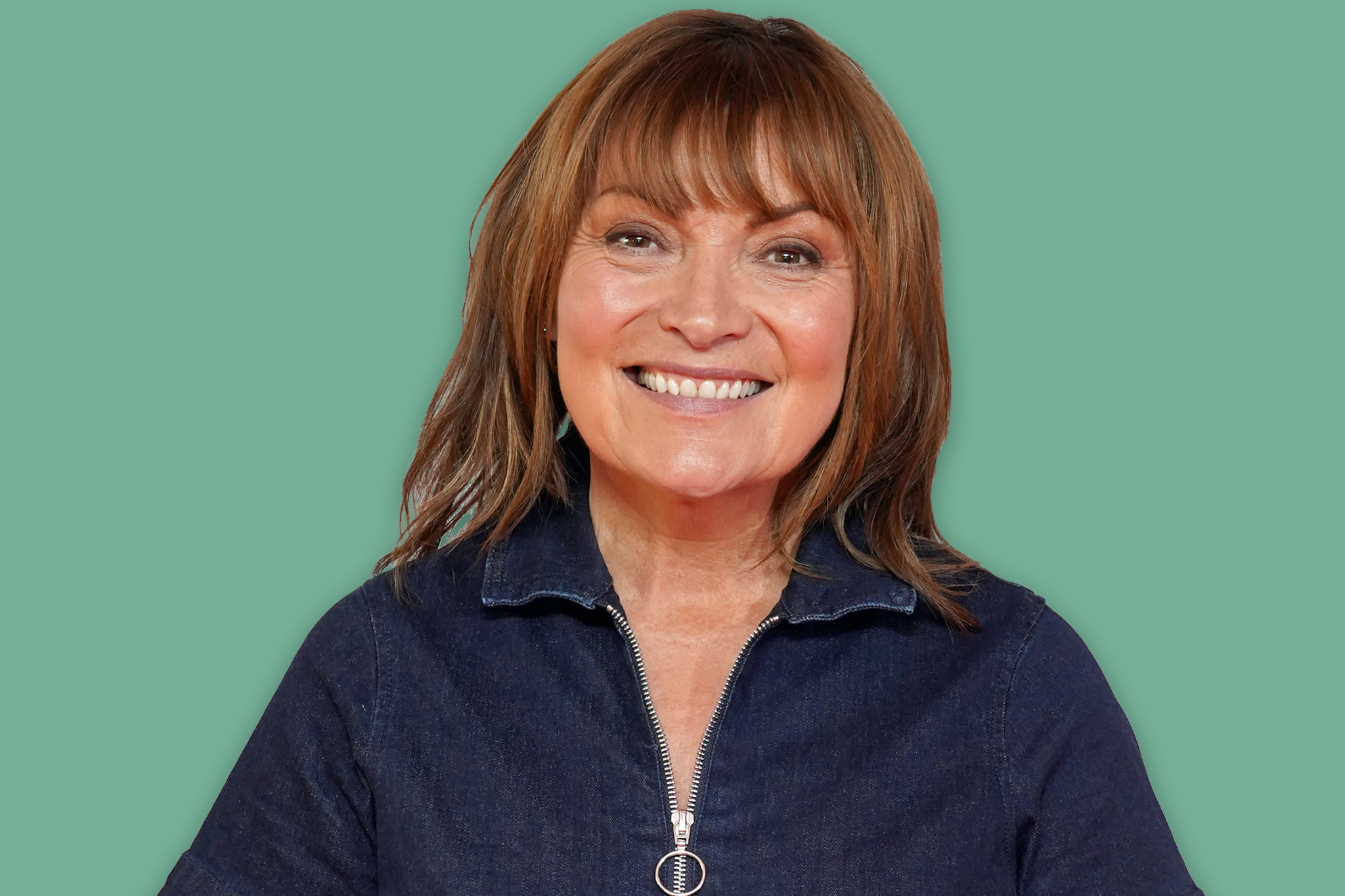How Lorraine Kelly proved her ex-boss wrong to become the queen of morning TV
Lorraine Kelly has been a fixture on our screens for four decades, but she was once told she’d never make it in TV because of her Glasgow accent. As the presenter prepares to receive Bafta’s prestigious Special Award, Katie Rosseinsky looks back at her rise to the top


Your support helps us to tell the story
From reproductive rights to climate change to Big Tech, The Independent is on the ground when the story is developing. Whether it's investigating the financials of Elon Musk's pro-Trump PAC or producing our latest documentary, 'The A Word', which shines a light on the American women fighting for reproductive rights, we know how important it is to parse out the facts from the messaging.
At such a critical moment in US history, we need reporters on the ground. Your donation allows us to keep sending journalists to speak to both sides of the story.
The Independent is trusted by Americans across the entire political spectrum. And unlike many other quality news outlets, we choose not to lock Americans out of our reporting and analysis with paywalls. We believe quality journalism should be available to everyone, paid for by those who can afford it.
Your support makes all the difference.In the summer of 1989, Lorraine Kelly, then the Scotland correspondent for ITV’s breakfast show TV-am, travelled down to the London studio. One of the usual hosts was on holiday, and Kelly had been drafted in as backup. The gig was only meant to last a week – but Kelly never really left. If you’ve tuned in to ITV on a weekday morning at any point over the past four decades or so, there’s a high chance that you’ll have been greeted by her soft Glaswegian tones.
Whether it wasTV-am in the Eighties, (the original) Good Morning Britain and GMTV in the Nineties and Noughties, or her own show Lorraine, which has been on air since 2010, Kelly has perched on a colourful sofa, delivering headlines, disarming famous guests, and juggling the strange high-low mix of breakfast telly: a feature on a dancing animal or a fashion trend one moment, an emotional report the next. She “always manages to make the daily demands of live broadcasting look easy”, as Bafta’s Hilary Rosen put it when the presenter was announced as the latest recipient of the organisation’s prestigious Special Award (she’ll receive the trophy, which recognises outstanding contribution to TV, at the Bafta Television Awards on 12 May).
What sets Kelly apart and coaxes us out of our morning stupor is her combination of everywoman warmth undercut with a certain steeliness: her one-time ITV colleague Piers Morgan once called her an “iron fist in a velvet glove”. Although she is sometimes written off as a purveyor of easy-watch fluff, Kelly’s reporting credentials are impeccable.
She was born in 1959 in the Gorbals, a working-class district of Glasgow, to a Catholic mother, Anne, and a Protestant father, John; the couple, aged 17 and 18, weren’t married when Anne became pregnant, and John’s mother suggested that they give the baby up for adoption in England. They refused, and initially brought up Kelly in a one-room flat. “Those early years sound Dickensian, but I couldn’t have had a better childhood,” she would later recall. Kelly turned down a place at university in order to take a job as a trainee journalist on the East Kilbride News (her degree would’ve been in English and Russian – as a teen, she was “fascinated” by the country’s history and literature).
A few years later, she landed a job at BBC Scotland as a researcher. She already had aspirations of appearing on camera, and eventually put herself forward for a role as a reporter. When she was called into the boss’s office, she dared to hope that she’d been successful. Instead, she was admonished for her accent, which the BBC exec described as “offensive”. He predicted that Kelly would never work on-screen – to prove him wrong, she successfully applied to beTV-am’s Scottish correspondent in 1984. “Luckily the boss was an Australian and didn’t really care how people spoke,” she later recalled.
Her new gig meant that she would travel around the country, covering everything from politics to sport. “I’d go to the end of the earth to get my story,” she told The Guardian. “If a day went by and I wasn’t on the bulletins, that was a failure. I had to have something on every day, and I worked my arse off, I really did.” It was here that she met her future husband, cameraman Steve Smith, part of the team who would accompany her on filming trips across Scotland; for their first date, he took her to watch his beloved Dundee United play football.

In 1988, she covered two major tragedies. First was the Piper Alpha disaster in July, when an oil rig exploded in the North Sea, killing 167 people. And five months later, Kelly would be one of the first reporters on the ground at Lockerbie, after a terrorist bomb exploded on a Pan Am flight, causing the plane to crash into the Scottish town.
The tragedy remains the deadliest terror attack in British history, killing 270 people (259 were passengers and 11 were on the ground). Kelly, 29 at the time, arrived at the town after hearing conflicting reports about a small aircraft falling from the sky, or about two military planes colliding. What she saw was “like the set of a disaster movie”, as she put it decades later: bodies, the wreckage of the plane’s cockpit, and huge craters in the streets. “It was horrendous, eerie, really quiet, with lots of weird smells,” she would recall. “But it is the aviation fuel that I remember most.” For a while, that scent would trigger memories of the scene. When Kelly returned to the town to film a documentary in 2023, she realised that she couldn’t recall many of the details of the incident, despite having reported on it in depth; a psychiatrist told her that she was experiencing classic signs of PTSD, something she had always shrugged off, believing it was only for “soldiers in a war zone”.
Her reporting from Lockerbie impressed viewers and also drew the attention of her TV-am bosses, so she was on their radar when they needed a stand-in presenter in the studio the following year. The broadcaster helped her out with rent when she moved down to London. Speaking on Woman’s Hour earlier this year, she noted that now, without similar support, it’s becoming more and more difficult for people from her background to get a break in TV. “Now it is purely a financial thing,” she said. “So the voices of a lot of working-class men and women[...] we’re not hearing them, because they can’t afford to live [in London].”

Watch Apple TV+ free for 7 days
New subscribers only. £8.99/mo. after free trial. Plan auto-renews until cancelled

Watch Apple TV+ free for 7 days
New subscribers only. £8.99/mo. after free trial. Plan auto-renews until cancelled
She managed to parlay that short cover gig into a more permanent role on Good Morning Britain’s early news slot, before joining the launch team for GMTV in 1993. But when she took time off for the birth of her daughter Rosie the following year, she was told that there would no longer be a space on the sofa for her. “It was shocking and certainly wouldn’t happen today,” Kelly said. But it turned out that she wouldn’t be off screen for long. The formula milk company Cow & Gate wanted to sponsor a parenting slot on GMTV, and specifically asked for Kelly to present it.
Soon she was back as one of the programme’s main hosts. And although she thought that Lockerbie would be the hardest moment of her career, she would have to return to Scotland in 1996 to cover the aftermath of the Dunblane school massacre. “I just about managed to hold it together during those three and a half hours of live television, but shed many tears afterwards,” she told The Scottish Sun 25 years on. Among those watching her broadcast was Pam Ross, whose young daughter Joanna was one of the 16 pupils killed; she got in touch with Kelly to talk about the tragedy off-camera, and the pair have remained friends for more than 25 years.

Since the Nineties, Kelly has been a fixture on the ITV morning schedule, standing firm in the face of various shake-ups and rebrands. Her cheerful manner often throws interviewees off guard. “Sometimes it’s better to give people space to talk, particularly toxic politicians,” she said, summing up her technique in The Guardian in 2022. “Let them talk for a wee bit; they’ll tie themselves up in knots and contradict themselves, then you can go in for the kill.”
You get the impression that she doesn’t suffer fools gladly, and that – after 40 years on air – she’s not afraid to go off-script sometimes and let her real opinions pierce the smiley persona (in 2019, Kelly won a £1.2m tax case after a tribunal ruled that she was self-employed and also performs as “a friendly, chatty and fun personality” on screen). For a case in point, see her scathing response when Jennifer Arcuri, who claimed to have been in a relationship with Boris Johnson, squirmed her way through a Good Morning Britain interview in 2019: “What’s the point, coming down and not answering any questions?” the no-nonsense Kelly said afterwards.
And then there was her chilly on-air run-in with former colleague turned Tory minister Esther McVey. In 2019, McVey appeared on Good Morning Britain, and during a live link with Kelly, presenter Susanna Reid asked her if she remembered working with the politician on GMTV in the Nineties. Kelly’s response (“Yes, yes, I do”) was curt to say the least, and when Piers Morgan pressed her for more details, she briefly channelled her inner Mariah “I don’t know her” Carey, telling Morgan: “I don’t remember love, I don’t remember at all.”
Later, Kelly revealed that she’d snubbed McVey because she “strongly disagree[d] with her on LGBT rights”. The presenter is a longtime LGBTQ+ ally and received Attitude magazine’s Honorary Gay Award in 2015. Her recent novel The Island Swimmer features a trans woman, Freya, among its cast of characters, which feels like a quietly bold move against the current political backdrop. “She happens to be trans, but that’s just a wee tiny part of her,” Kelly told The Scotsman before the book was published. “She’s just who she’s supposed to be, and I wanted people to understand that and to realise that underneath it all [...] we’re all just trying to get on with our lives.”
Kelly tends to demur when she’s called the queen of daytime TV – on Woman’s Hour earlier this year, she joked that she feels more like the “dowager duchess”. But in her four decades on screen, she has certainly mastered her medium (and brought a dash of grit and good humour to proceedings too). Not bad for the Glasgow girl who was told she’d never make it on TV.
Join our commenting forum
Join thought-provoking conversations, follow other Independent readers and see their replies
Comments